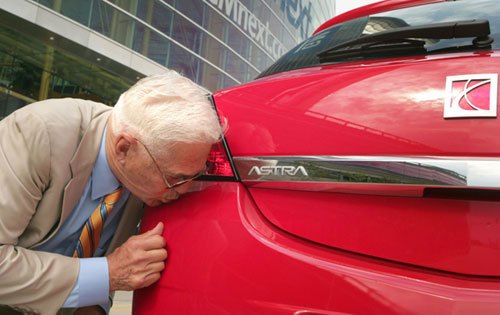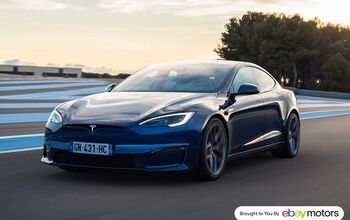Quote of the Day: GM Marketing Maven, Maximum Bob Lutz: "You're Going to Hear a Lot More From Others About the New EPA Procedures and How We Arrived at These Figures"
Holy shit, another GM website? I swear I’ve lost track of GM’s online PR blitz—and I do this for a living. Let’s see . . . GM, GMfactsandfiction, GMeuropefactsandfiction, The Lab, GMreinvention, GM-volt, tellfritz, Fastlane, GMblogs (both YouTube and Twitter), four new eBay California partner sites, and I’m sure there’s more. Well, there’s at least one more: Chevroletvoltage.com. And on this august (August?) website, GM Marketing Maven Maximum Bob Lutz is busy defending GM’s decision to announce that the Volt will get 230 mpg in city driving—deploying his usual combination of condescension, cheerleading, willful ignorance and prevarication.
If you haven’t heard, 230 is the estimated city fuel economy number for the Chevrolet Volt, as in 230 miles per gallon, according to new federal fuel economy procedures under development [italics added] by the U.S. Environmental Protection Agency for plug-in electric vehicles. And we anticipate a composite fuel economy rating of more than 100 mpg. The Volt’s estimated electricity usage is about 25 kilowatts per 100 miles, about half of what a typical household uses daily.
You’re going to hear a lot more from others about the new EPA procedures and how we arrived at these figures.
Oh no! Not “others!” Those damn, nay-saying, fun-spoiling, non-GM “others.” The “others” created the perception gap, you know. I HATE others. If you want proof that GM’s insularity makes the Great Wall of China look like a backyard fence, here it is.
Anyway, we have heard a lot about GM’s 230 mpg calculations, haven’t we? Not much of it along the lines of yes, that’s right, 230 mpg for the Chevrolet Volt in the EPA urban cycle. Absolutely. And we expect to hear a lot more about that number when the EPA devises an actual “fuel efficiency” standard for EVs and PHEVs AND when the Volt fails to achieve 230 mpg in any way meaningful to its [still theoretical] buyers.
Of this future irony Mr. Lutz is not unaware. (Surprisingly enough.) Hence Bob’s use of the word “but” in the next sentence.
But I will point out that, in the big picture, what this means is that Chevrolet is committed to seeing through the promise of Volt, and to building the cars that customers want and need. Volt is a bold step, a risk for both Chevy and GM. Our new corporate culture dictates that not only do we make bold moves, but also that we move quickly. And on Volt, we are absolutely moving as quickly as possible.
Bold moves, eh? Now where have I heard THAT before? And moving as quickly as possible means . . . moving as quickly as possible. Nothing more. Nothing less. Once again, on yet another website, Bob Lutz’s e-lips are moving, but he’s not saying anything. Well nothing particularly coherent, anyway.
And this is further proof. I’ve said before that Volt is like our moon shot, and I stand by that statement. It’s exactly like a moon shot, if the lunar landing module were getting 230 miles per gallon!
I could, of course, make some witty rejoinder. But I kinda like a comment underneath Mr. Lutz’s post, by Prophet1957:
The Saturn 5 rocket which sent the Astronauts to the moon [burned] approx 960,000 gallons of fuel. [It’s] 238,855 miles to the moon. Approx. 4 gallons per mile.
Anyone know how much fuel the actual lunar lander used and how many miles it traveled? Meanwhile, oy vey.
More by Robert Farago
Latest Car Reviews
Read moreLatest Product Reviews
Read moreRecent Comments
- Peter Buying an EV from Toyota is like buying a Bible from Donald Trump. Don’t be surprised if some very important parts are left out.
- Sheila I have a 2016 Kia Sorento that just threw a rod out of the engine case. Filed a claim for new engine and was denied…..due to a loop hole that was included in the Class Action Engine Settlement so Hyundai and Kia would be able to deny a large percentage of cars with prematurely failed engines. It’s called the KSDS Improvement Campaign. Ever hear of such a thing? It’s not even a Recall, although they know these engines are very dangerous. As unknowing consumers load themselves and kids in them everyday. Are their any new Class Action Lawsuits that anyone knows of?
- Alan Well, it will take 30 years to fix Nissan up after the Renault Alliance reduced Nissan to a paltry mess.I think Nissan will eventually improve.
- Alan This will be overpriced for what it offers.I think the "Western" auto manufacturers rip off the consumer with the Thai and Chinese made vehicles.A Chinese made Model 3 in Australia is over $70k AUD(for 1995 $45k USD) which is far more expensive than a similar Chinesium EV of equal or better quality and loaded with goodies.Chinese pickups are $20k to $30k cheaper than Thai built pickups from Ford and the Japanese brands. Who's ripping who off?
- Alan Years ago Jack Baruth held a "competition" for a piece from the B&B on the oddest pickup story (or something like that). I think 5 people were awarded the prizes.I never received mine, something about being in Australia. If TTAC is global how do you offer prizes to those overseas or are we omitted on the sly from competing?In the end I lost significant respect for Baruth.


































Comments
Join the conversation